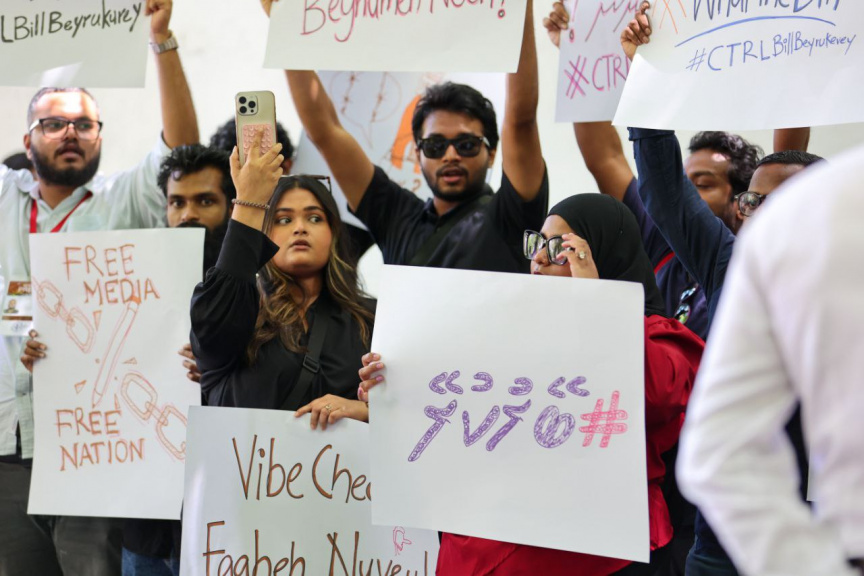
Journalists protest against the media control bill outside the Parliament building on August 27, 2025. (Sun Photo/Maaniu Mohamed)
The Maldives Journalists Association (MJA) asked for four months to conduct an analysis of the media bill and a review of the existing media regulatory system on Monday, as the Parliament’s Independent Institutions Committee works through recess on a contentious new legislature that allows the government control over media outlets.
On August 18, Thulhaadhoo MP Abdul Hannan Aboobakr, an independent lawmaker aligned with the government, submitted a bill that seeks to dissolve the Maldives Media Council (MMC) and the BroadCom, replacing them with a single regulatory body — a seven-member Maldives Media and Broadcasting Commission (MMBC), composed of four members elected by the media and three appointed by the President of the Maldives with parliamentary approval, with the President also given the authority to appoint the commission’s head. It also empowers the MMBC to impose major penalties against media outlets as well as individual journalists, including during the investigative stage.
The bill, widely panned both local and international journalism groups, is openly backed by the People’s National Congress (PNC) administration. The Parliament, which is currently in recess, held an extraordinary sitting amid protests on August 27, during which the ruling party used its supermajority to accept the bill and send it to the Independent Institutions Committee for review.
The committee, which has set a set a September 15 deadline for the bill, with a 10-day window for public opinion, and a three-day window for consultation with stakeholders, held a meeting with media representatives on Monday, during which they made unified appeals against the planned changes.
Speaking to reporters after Monday’s committee meeting, MJA’s executive director Mohamed Junaid said that he does not understand the need to rush the bill.
He noted that all journalists who attended the meeting asked for the bill to be withdrawn.
“We, the MJA, have sent a letter to the committee asking for at least four months,” he said.
“The MJA will make recommendations to the committee following a review of the existing regulatory system and an analysis of the proposed bill. It is our hope that the committee allows us this.”
Junaid urged the Parliament to take the right path, instead of rushing the passage of the bill.
In addition to allowing the President power over appointment of its members, the new bill also empowers the proposed commission to impose major penalties against media outlets as well as individual journalists, including during the investigative stage. This includes:
Following mounting pressure over the contentious provisions, President Dr. Mohamed Muizzu insisted that his administration remains “100 percent pro-media” and has no interest in controlling the press. He said that the administration would recommend amendments to the bill through the Attorney General’s Office, but has not committed to instructing the withdrawal the bill – as is demanded by journalists.